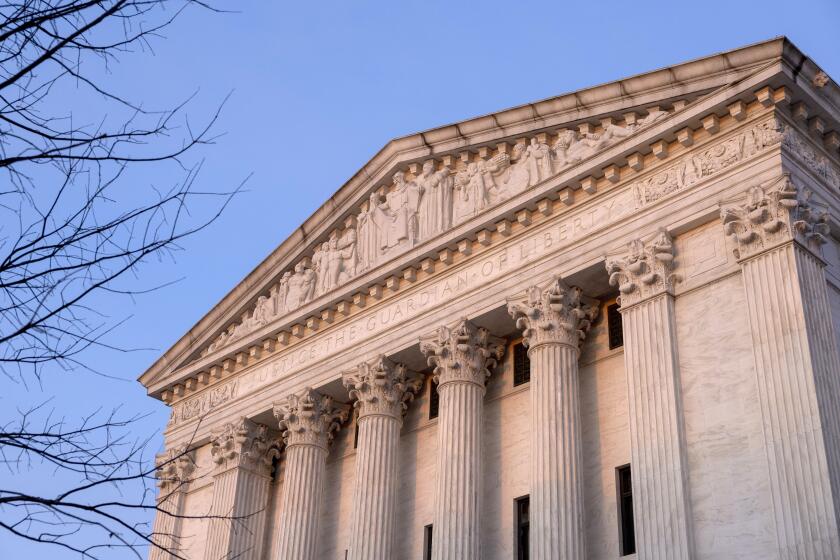Romney says Obama’s ‘passivity’ has made Middle East less secure
LEXINGTON, Va. — President Obama’s chief foreign policy achievement in his first term was his order to carry out the daring raid in Pakistan that killed Osama bin Laden. But Mitt Romney challenged his rival on that turf Monday, arguing that Obama has not done enough to secure peace in the Middle East, allowing terrorist networks to build strength while “leaving our destiny at the mercy of events.”
During a formal foreign policy address at the Virginia Military Institute here in Lexington, Romney said Americans should take pride “in the blows that our military and intelligence professionals have inflicted on Al Qaeda” in Pakistan and Afghanistan — which he called “real achievements won at a high cost.”
But he argued that Al Qaeda “remains a strong force in Yemen and Somalia, in Libya and other parts of North Africa, in Iraq, and now in Syria.”
“Drones and the modern instruments of war are important tools in our fight, but they are no substitute for a national security strategy for the Middle East,” Romney said.
PHOTOS: Memorable presidential debate moments
Romney’s comments contradict the Obama administration’s arguments that its years of counterterrorism efforts have decimated Al Qaeda, the primary terrorist threat. But U.S. officials and private terrorism experts acknowledge that militant groups with ties to Al Qaeda or at least similar aims continue to flourish in many parts of the world, including the Middle East and North Africa. Terrorist groups in Yemen, Somalia, Libya and Mali, among other places, have become a growing focus of U.S. and Western efforts.
The influence of Al Qaeda is a new point of emphasis for Romney, and a clear pivot from the economy, after many months in which foreign policy has been an afterthought for his campaign. With little foreign policy expertise of his own and after a difficult foreign trip in which he managed to offend both the Brits (over the handling of the Olympics) and later the Palestinians (with an offhand comment about the wealth disparity between Israel and Palestine), the area has long appeared to be a vulnerability for Romney.
But in these closing weeks of the campaign, the Republican presidential nominee has seized on the unrest in Libya, Egypt, Syria and Iran to make the case that the president has been too passive in helping advocates of Democracy gain a foothold around the world.
PHOTOS: U.S. ambassador killed in Libya
“We cannot support our friends and defeat our enemies in the Middle East when our words are not backed up by deeds, when our defense spending is being arbitrarily and deeply cut, when we have no trade agenda to speak of, and the perception of our strategy is not one of partnership but of passivity,” he said Friday.
He argued that activists in Syria and Iran felt abandoned by the U.S. during their struggles for a more Democratic society: “Unfortunately, so many of these people who could be our friends feel that our president is indifferent to their quest for freedom and dignity.”
Even though Romney bungled his own initial response to the attack on the U.S. Consulate in Libya — by issuing a hasty and political statement before the facts were known about the attack that killed the U.S. ambassador and three Americans — he said Monday that he would try to do more to “support the Libyan people’s efforts to forge a lasting government that represents all of them.”
He did not offer any detail about what those efforts might look like.
Much of Romney’s speech on Friday focused on the threat of a nuclear Iran — he vowed to impose tougher sanction, though the Obama administration has been praised, even by Republicans, for taking a hard line on sanctions. Romney also said he would make aircraft carrier task forces a permanent presence in the eastern Mediterranean and the gulf region.
Romney vowed to “recommit America to the goal of a democratic, prosperous Palestinian state living side by side in peace and security with the Jewish state of Israel.”
INTERACTIVE: Battleground states map
That statement was a shift from remarks that Romney made behind closed doors at a May fundraiser that was secretly taped and leaked to Mother Jones magazine. In that private setting, Romney said he was concerned that Palestinians “have no interest whatsoever in establishing peace, and that the pathway to peace is almost unthinkable to accomplish.”
Paul Richter contributed to this report from Washington.
Follow Politics Now on Twitter and Facebook
Twitter: @MaeveReston
More to Read
Get the L.A. Times Politics newsletter
Deeply reported insights into legislation, politics and policy from Sacramento, Washington and beyond. In your inbox three times per week.
You may occasionally receive promotional content from the Los Angeles Times.







